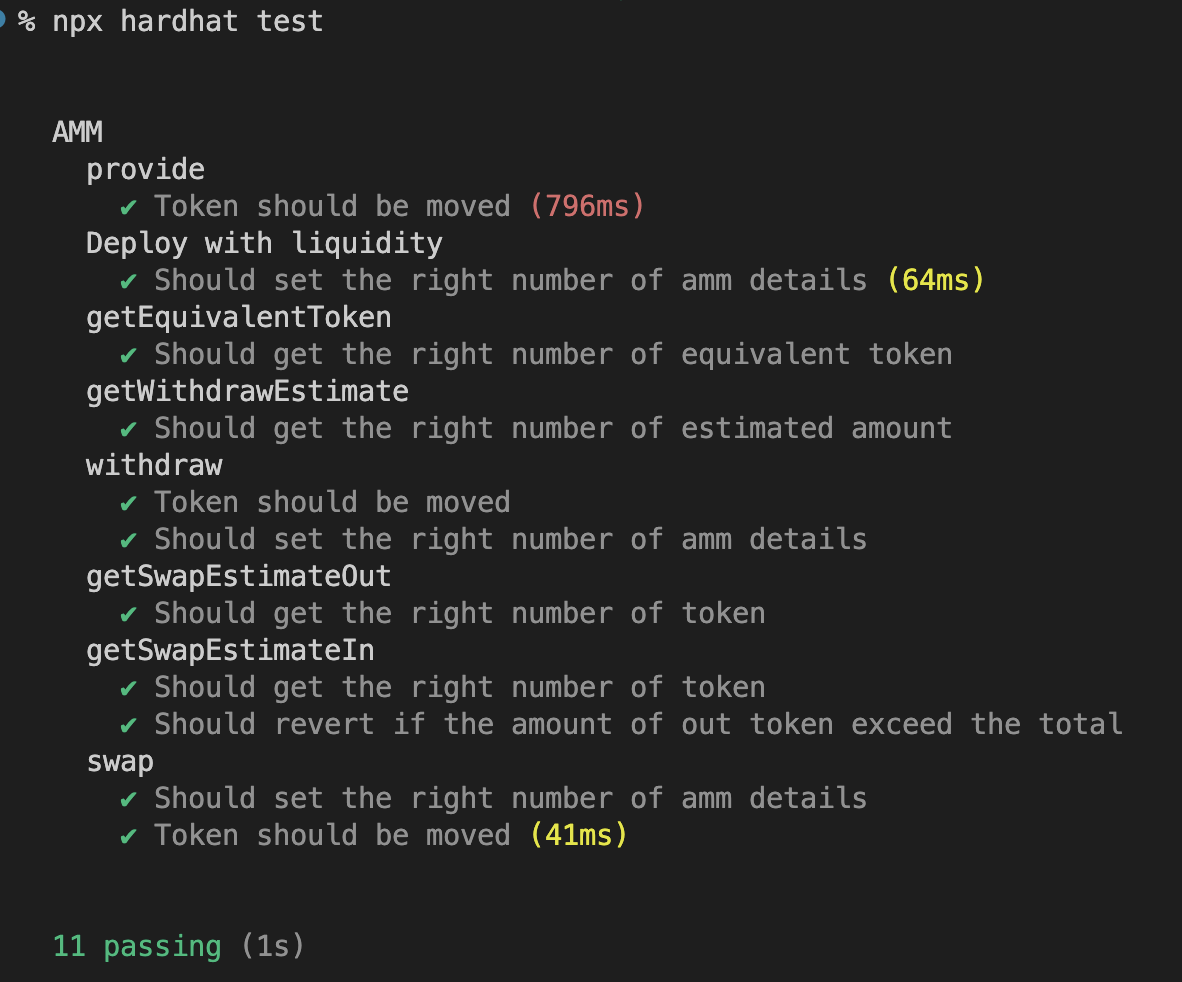Implementing Swap
🔥 Let's Implement swap
In the previous lesson, we learned how to calculate the amount of tokens to be transferred to the user when performing a token swap.
In this lesson, we will implement the swap function in the contract.
At the end of the AMM.sol contract, add the following two functions:
// Calculates the amount of output token from the input token amount
function getSwapEstimateOut(IERC20 inToken, uint256 amountIn)
public
view
activePool
validToken(inToken)
returns (uint256)
{
IERC20 outToken = _pairToken(inToken);
uint256 amountInWithFee = amountIn * 997;
uint256 numerator = amountInWithFee * totalAmount[outToken];
uint256 denominator = totalAmount[inToken] * 1000 + amountInWithFee;
uint256 amountOut = numerator / denominator;
return amountOut;
}
// Calculates the amount of input token required from the desired output token amount
function getSwapEstimateIn(IERC20 outToken, uint256 amountOut)
public
view
activePool
validToken(outToken)
returns (uint256)
{
require(
amountOut < totalAmount[outToken],
"Insufficient pool balance"
);
IERC20 inToken = _pairToken(outToken);
uint256 numerator = 1000 * totalAmount[inToken] * amountOut;
uint256 denominator = 997 * (totalAmount[outToken] - amountOut);
uint256 amountIn = numerator / denominator;
return amountIn;
}
The getSwapEstimateOut function implements Scenario 1 from the previous lesson.
It returns the amount of output token to be sent to the user based on the input token (inToken) and amount (amountIn).
The term out refers to tokens going out of the pool, and in refers to tokens coming into the pool.
The internal formula used is the one derived in the last lesson.
The getSwapEstimateIn function implements Scenario 2 from the previous lesson.
It returns the amount of input tokens required to obtain a desired amount of output tokens.
Below these, add the following function to complete the contract:
function swap(
IERC20 inToken,
IERC20 outToken,
uint256 amountIn
) external activePool validTokens(inToken, outToken) returns (uint256) {
require(amountIn > 0, "Amount cannot be zero!");
uint256 amountOut = getSwapEstimateOut(inToken, amountIn);
inToken.transferFrom(msg.sender, address(this), amountIn);
totalAmount[inToken] += amountIn;
totalAmount[outToken] -= amountOut;
outToken.transfer(msg.sender, amountOut);
return amountOut;
}
The swap function is straightforward: it uses getSwapEstimateOut to calculate the amount of tokens to send to the user, transfers inToken from the user to the contract, and transfers outToken from the contract to the user.
🧪 Let's Add Tests
Now let's write tests for the added functions.
Add the following to the end of test/AMM.ts:
describe("getSwapEstimateOut", function () {
it("Should get the right number of token", async function () {
const { amm, token0, token1 } = await loadFixture(
deployContractWithLiquidity
);
const totalToken0 = await amm.totalAmount(token0.address);
const totalToken1 = await amm.totalAmount(token1.address);
const amountInToken0 = ethers.utils.parseEther("10");
const amountInToken0WithFee = amountInToken0.mul(997);
const amountReceiveToken1 = amountInToken0WithFee
.mul(totalToken1)
.div(totalToken0.mul(1000).add(amountInToken0WithFee));
expect(await amm.getSwapEstimateOut(token0.address, amountInToken0)).to.eql(
amountReceiveToken1
);
});
});
describe("getSwapEstimateIn", function () {
it("Should get the right number of token", async function () {
const { amm, token0, token1 } = await loadFixture(
deployContractWithLiquidity
);
const totalToken0 = await amm.totalAmount(token0.address);
const totalToken1 = await amm.totalAmount(token1.address);
const amountOutToken1 = ethers.utils.parseEther("10");
const amountInToken0 = totalToken0
.mul(amountOutToken1)
.mul(1000)
.div(totalToken1.sub(amountOutToken1).mul(997));
expect(await amm.getSwapEstimateIn(token1.address, amountOutToken1)).to.eql(
amountInToken0
);
});
it("Should revert if the amount of out token exceed the total", async function () {
const { amm, token1, amountOwnerProvided1, amountOtherProvided1 } =
await loadFixture(deployContractWithLiquidity);
const amountSendToken1 = amountOwnerProvided1
.add(amountOtherProvided1)
.add(1);
await expect(
amm.getSwapEstimateIn(token1.address, amountSendToken1)
).to.be.revertedWith("Insufficient pool balance");
});
});
The tests ensure that getSwapEstimateOut and getSwapEstimateIn return correct values by comparing them with manually calculated values.
Also, getSwapEstimateIn is tested to revert if the specified token amount exceeds the pool balance.
Now add the following tests:
describe("swap", function () {
it("Should set the right number of amm details", async function () {
const {
amm,
token0,
amountOwnerProvided0,
amountOtherProvided0,
token1,
amountOwnerProvided1,
amountOtherProvided1,
} = await loadFixture(deployContractWithLiquidity);
const amountSendToken0 = ethers.utils.parseEther("10");
const amountReceiveToken1 = await amm.getSwapEstimateOut(
token0.address,
amountSendToken0
);
await token0.approve(amm.address, amountSendToken0);
await amm.swap(token0.address, token1.address, amountSendToken0);
expect(await amm.totalAmount(token0.address)).to.equal(
amountOwnerProvided0.add(amountOtherProvided0).add(amountSendToken0)
);
expect(await amm.totalAmount(token1.address)).to.equal(
amountOwnerProvided1.add(amountOtherProvided1).sub(amountReceiveToken1)
);
});
it("Token should be moved", async function () {
const { amm, token0, token1, owner } = await loadFixture(
deployContractWithLiquidity
);
const ownerBalance0Before = await token0.balanceOf(owner.address);
const ownerBalance1Before = await token1.balanceOf(owner.address);
const ammBalance0Before = await token0.balanceOf(amm.address);
const ammBalance1Before = await token1.balanceOf(amm.address);
const amountSendToken0 = ethers.utils.parseEther("10");
const amountReceiveToken1 = await amm.getSwapEstimateOut(
token0.address,
amountSendToken0
);
await token0.approve(amm.address, amountSendToken0);
await amm.swap(token0.address, token1.address, amountSendToken0);
expect(await token0.balanceOf(owner.address)).to.eql(
ownerBalance0Before.sub(amountSendToken0)
);
expect(await token1.balanceOf(owner.address)).to.eql(
ownerBalance1Before.add(amountReceiveToken1)
);
expect(await token0.balanceOf(amm.address)).to.eql(
ammBalance0Before.add(amountSendToken0)
);
expect(await token1.balanceOf(amm.address)).to.eql(
ammBalance1Before.sub(amountReceiveToken1)
);
});
});
These swap tests check whether the state variables of the AMM are updated correctly and whether tokens are moved as expected.
⭐ Run the Tests
Run the following command in your terminal:
yarn test
If you see output like below, your tests are successful!

🌔 Reference
The completed project repository is available here.
If things don’t work as expected, feel free to refer to it.
🙋♂️ Ask Questions
If you have any questions at this point, please post them in the Discord #avalanche channel.
To get help more smoothly, include the following in your error report ✨
1. Section and lesson number related to your question
2. What you were trying to do
3. Copy & paste the error message
4. Screenshot of the error screen
Congratulations! You’ve completed Section 2. The contract is now complete!
In the next section, we’ll create the frontend 🏌️♀️